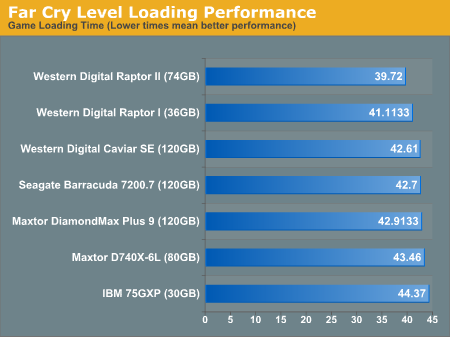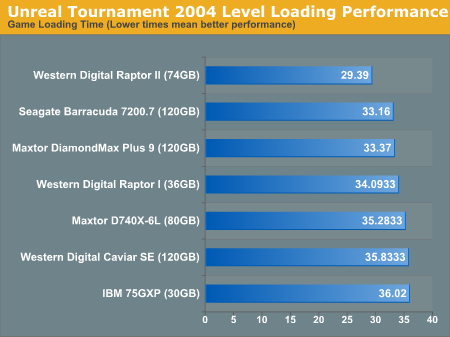Q2 2004 Desktop Hard Drive Comparison: WD Raptor vs the World
by Anand Lal Shimpi on June 7, 2004 12:05 AM EST- Posted in
- Storage
Game Loading Performance
One test that everyone wants to see when it comes to hard disk reviews is something game-related. For the most part, gamers agree that your hard drive isn't limiting performance while you're actually playing a game. After all, if you are swapping to disk a lot, then your gaming experience is going to be pretty poor, regardless of how fast your disk is. But what is important and very noticeable when it comes to disk performance in games are loading times.
Today's games have arguably some of the worst loading times ever, thanks to extremely large artwork, levels and other game data that must be loaded before game play can begin. Games also provide a very tangible and perceivable platform for hard disk performance comparison; while even Winstone scores may be difficult to relate to, everyone knows what waiting longer feels like.
For our game loading tests, we used two games: Far Cry and Unreal Tournament 2004. Both games were installed, in full, to the hard drive. We then used no-CD patches to prevent any accessing of the CD/DVD drive to skew the loading process. Both games were installed to a clean drive without anything else present on the drive (the OS is located on a separate drive).
Our Far Cry test consists of starting a campaign with the default difficulty level, hitting escape to skip the introductory movie and beginning the stop watch timer at first sight of the loading screen. The stop watch timer is stopped as soon as the loading screen disappears. The test is repeated three times with the final score reported being an average of the three. In order to avoid the effects of caching, we reboot between runs. All times are reported in seconds, lower scores obviously being better.

The benefits of a 10,000RPM spindle speed are not much when just looking at the first generation Raptor, but the new Raptor manages to offer a 6% performance advantage even over the current generation 7200RPM 8MB cache drives.
Our Unreal Tournament 2004 test uses the full version of the game and leaves all settings on defaults. After launching the game, we select Instant Action from the menu, choose Assault mode and select the Robot Factory level. The stop watch timer is started right after the Play button is clicked, and stopped when the loading screen disappears. The test is repeated three times with the final score reported being an average of the three. In order to avoid the effects of caching, we reboot between runs. All times are reported in seconds, lower scores obviously being better.

The UT test shows similar standings (although there is a bit of swapping amongst the 7200RPM 8MB cache contenders), but the 2nd generation Raptor extends its lead over its predecessor significantly. The first generation Raptor is even slightly outpaced by Seagate's 7200.7 series.










50 Comments
View All Comments
MikhailT - Wednesday, June 9, 2004 - link
For a gamer, it would be a better idea to get a single 74gb raptor instead of raid0 with 2x36 raptors. I don't think there will be any difference between both situation. Raid0 might have data failure issue over long term no?ElFenix - Wednesday, June 9, 2004 - link
I'd like to see the SATA version of the 7200.7 myself, SR generally feels that the SATA version is somewhat faster than the PATA version.Also, about the Hitachis... they tend to 'meow' at you every once in a while... supposedly that increases their reliability, but when i'm going for silence it isn't wanted. When silence is key i'll go with the ultra-quiet, reliable, non-meowing, still fast, and dirt cheap ($0.35/gig) 7200.7
T8000 - Tuesday, June 8, 2004 - link
#36, it is nice to know you did get a performance boost, but I would like to ask what drive you had before and if you bought the 74 GB Raptor.This is important, because there is a large performance difference between the latest 7200 RPM drives and the early sub 20 GB ones.
Also, SCSI drives are famous for their loud whining noise, so a lot of people I heard would not even use a SCSI drive if it would be free, unless they become more silent, so this may be a good reason why SCSI drives are not used much in workstations.
Tostada - Tuesday, June 8, 2004 - link
The SATA Hitachi Deskstar 7K250 (which has 8MB cache and a 3-year warranty) is generally cheaper, faster, and quieter than every comparable drive. Well, the Samsung is a little quieter. The Hitachi 7K250 is about as fast as a Raptor 36G, though. In my experience, the only practical drives to buy these days are:Samsung for ATA
Hitachi 7K250 for SATA
Raptor 740GD for SATA if you want the absolute best performance.
Look at NewEgg's current price of the Hitachi 7K250 SATA line with 8MB cache and 3-year warranty:
80GB = $74.00 delivered
160GB = $103.50 delivered
250GB = $194.00 delivered
Raptor 740GD = $200.00 delivered
The Raptor 740GD is 25% faster in some situations. Still, in most systems I would prefer to spend $200 for a RAID of two 160GB Hitachi's instead of a single 74GB Raptor.
I see many people still recommending WD's non-Raptor drives, which just don't keep up. Here's some stats from StorageReview.
High-End DriveMark 2002:
Raptor 740GD: 585 IO/sec
Raptor 360GD: 467 IO/sec
Hitachi 7K250: 442 IO/sec
WD800JB: 375 IO/sec
StorageReview Gaming DriveMark 2002:
Raptor 740GD: 749 IO/sec
Raptor 360GD: 588 IO/sec
Hitachi 7K250: 588 IO/sec
WD800JB: 477 IO/sec
WB99 Max Read Transfer Rate:
Raptor 740GD: 71.8 MB/sec
Raptor 360GD: 57.4 MB/sec
Hitachi 7K250: 60.4 MB/sec
WD800JB: 49.3 MB/sec
Idle Noise:
Raptor 740GD: 42.3 dB/A
Raptor 360GD: 43.1 dB/A
Hitachi 7K250: 41.5 dB/A
WD800JB: 45.0 dB/A
tmhartsr - Tuesday, June 8, 2004 - link
Recently upgraded my primary desktop to Raptor 10K. Actual improvement in everyday system performance and quickness is very noticable! An excellent practical measure of disk performance is writing/restoring a Ghost Image between two of these various drives. The difference is strikingly clear in this real world measure. I think disk performance has been much overlooked recently and deserves much more attention. Also that SCSI 320 should always be included in these comparisions. SCSI 320 is under-utilized in high end systems? Also what effect will new PCI Express boards have on HD performance and development?Kravahn - Tuesday, June 8, 2004 - link
A little clarification... I'm used to seeing frank recommendations on AnandTech, and this was more than ambiguous. It should have said... 'if you want the best performance possible, the latest Raptor is for you; with that in mind, nearly equivalent performance, and certainly more bang for the buck can be had with the current 8MB PATA iterations tested here.'Kravahn - Tuesday, June 8, 2004 - link
Another point regarding final analyses... a 10% increase in performance is definitely notable, but when that 10%increase relates to a 39 second vs. a 42 second load time, it becomes negligible. It seems silly to me to pay more money for less storage to save three seconds. The geek in me loves the numbers, but as a reseller it's hard for me to sell a product just because it's a little faster, especially when my customer would be sacrificing 50G of storage. I think the summary should include a bit of reality and not just factual conclusions.Mackintire - Monday, June 7, 2004 - link
demonbug - Monday, June 7, 2004 - link
First of all, great HD performance comparison - I just have a nitpick. My only comment is in regards to the game loading test. You must have one quick thumb on the stopwatch to measure down to the ten-thousandth of a second as you show on the graphs. I know, probably comes from averaging, but come on - round it to the nearest tenth, or hundredth at least (if you think you were really that quick with the stopwatch). Didn't they ever teach you about significant digits in school?GOSHARKS - Monday, June 7, 2004 - link
discussion regarding the article in the forums:http://forums.anandtech.com/messageview.cfm?catid=...
i have to say that the article really suprised me and the results are quite INTERESTING